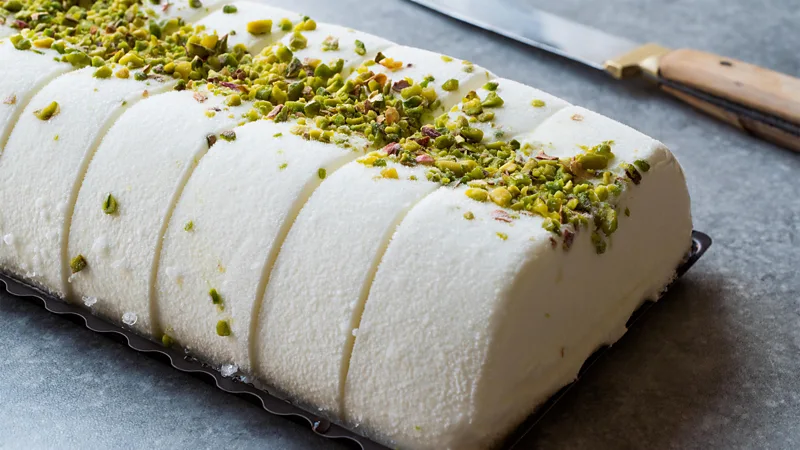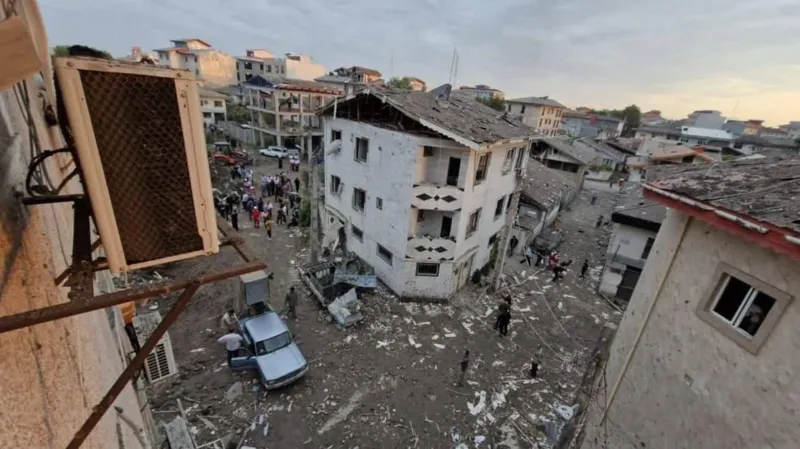Dondurma: The Turkish ice cream eaten with a knife and fork
Dense, stretchy and durable, dondurma isn't like any other ice cream you'll find, and the epicentre of its production is still reeling from the powerful earthquakes that decimated the nation.

On a warm and breezy early summer evening in Istanbul, I took the metro to the city's Bayrampaşa district just west of the Old City in search of Maraş-made dondurma: the best ice cream in the country.
Produced in Turkey's southern Kahramanmaraş (or Maraş, for short) province, dondurma may translate as "ice cream," but this frozen Turkish treat isn't like any other gelato, sherbet or ice cream you're likely to find. Dondurma is renowned for its thick, dense and stretchy texture, and instead of licking it from a cone, you eat it on a plate with a knife and fork.
Dessert master Mehmet Vanlı, who runs the shop Hacıhaliloğlu in Bayrampaşa, has been making dondurma for half a century. He learned the trade alongside Osman Kanbur, the eldest brother of the family who runs Mado, Turkey's most iconic dondurma chain, with more than 300 locations throughout the country. (The name Mado is an abbreviated portmanteau of "Maraş" and "dondurma.")
When I arrived at the shop's neon-lit exterior and approached its expansive counter to ask for dondurma, Vanlı brought out two hulking cylindrical slabs the size of my forearm from a box, sliced three hefty pieces with a giantbutcher's knife and topped them with a sprinkle of pistachio dust.
As he offered me a piece, he explained that, traditionally, dondurma's only ingredients are milk (in this case, a blend of goat's, sheep's and cow's milk) salep (orchid bulb flour) and beet sugar.
"If you want the original, you make it with pure goat's milk. For the consistency, we use quality salep from the mountains. It dries out amid the aridness for a year. The single enemy of dondurma is the wind. In the heat of the Sun, dondurma doesn't melt easily, but it does in the wind," Vanlı explained, adding that Maraş' climate, with its hot, dry summers and cold, dry winters provides the optimal conditions for dondurma production.
Even on that muggy Istanbul evening, my plate of dondurma didn't melt quickly. I dove in with a knife and fork, marvelling at how this Turkish ice cream tasted smoother and sweeter than regular ice cream. Refreshing and creamy, dondurma somehow manages to both feel more substantial than regular ice cream while also softer and silkier, thanks to the salep.
For years, Vanlı made dondurma himself, but because it's best to produce dondurma as close as possible to where its ingredients are sourced in the mountains, Vanlı now buys it from a reputable producer in Maraş.
"I think what makes [dondurma from Maraş] special is Mount Ahır, for two reasons," said Dr Kübra Yüzyüncil, a food and agricultural researcher. "First, this high-altitude mountain in the south-eastern Taurus Mountain range has high biodiversity. The milk of the goats grazing amid this richness, for example, feeding on thyme, crocus and hyacinth, results in milk that is very nutritious and delicious."
"The second is the salep orchid species called Dactylorhiza romana, which grows in the natural flora of this mountain. This type of salep has a high amount of glucomannan (a dietary fiber). It is this special type of salep orchid that gives Maraş ice cream its consistency and allows it to stretch continuously without breaking. It acts as a stabiliser," Yüzyüncil added.
Yet, production of Turkey's beloved homegrown ice cream was jeopardised in February 2023 when two 7.7- and 7.6-magnitude earthquakes whose epicentres were in the Maraş districts of Elbistan and Pazarcık decimated parts of Turkey, killing some 53,000 people. In spite of the tragedy, Maraş dondurma producers were able to maintain and even increase their production. In 2022, the province churned out 100,000 tons of dondurma and exported $2.5m million worth, while in 2023 those figures accelerated to 120,000 tons and $3m in exports.
"As [Maraş was] emerging from the earthquake, some of our facilities were destroyed or damaged, but we mobilised to get back on our feet. We carried [on]," Erdal Kanbur, the president of a Maraş-based restauranteurs association, told local media.
"I think one of the most important factors that makes Maraş province the leading ice cream producer in Turkey is that Maraş ice cream does not melt easily, thanks to its high glucomannan content. Thanks to this feature, it can be sent to all cities," Yüzyüncil said. "In addition, the patisseries that make ice cream in Maraş… have invested in establishing their own ice cream brands in order to gain competitive power. They obtained internationally recognised certificates, packaged and sent it across continents without compromising the flavour and consistency of the ice cream."
Vanlı pointed to a photograph of him during his younger years, beaming alongside a colleague and both clutching a massive stretch of dondurma the size of a boa constrictor. Outside his shop was a cooler with several dozen flavours of traditional, ice cream, while inside there was a refrigerator full of products made by Marasta, a 30-year-old company from which Vanlı sources all of his dondurma.
On Istanbul's busiest and most iconic street, the pedestrian-only Istiklal Avenue, talented tricksters can be found twisting and twirling huge slabs of dondurma, performing full-on shows that involve repeatedly extending and seizing back dondurma from unsuspecting tourists who pay inflated prices for this spectacle. As any true local Istanbul resident would tell you, these places are tourist traps to be avoided, and those in search of Turkey's best ice cream would be advised to head to Vanlı's shop for the real deal.
With Mado now operating in more than 20 countries and smaller Maraş producers increasing their exports, Maraş dondurma is on its way to making Turkey internationally recognised for its ice cream. It's a deserving distinction, and one that Turks think is long overdue.
"I love Maraş [dondurma] very much," Yüzyüncil said. "It leaves its mark on the palate."
-BBC







